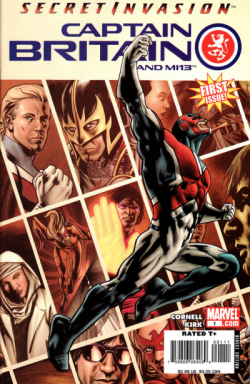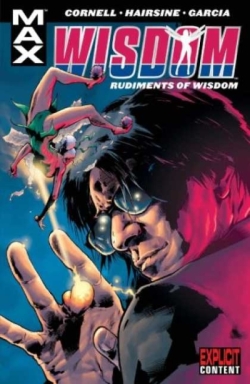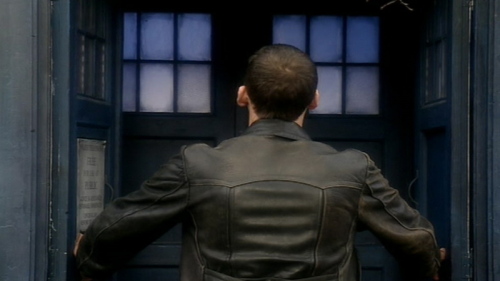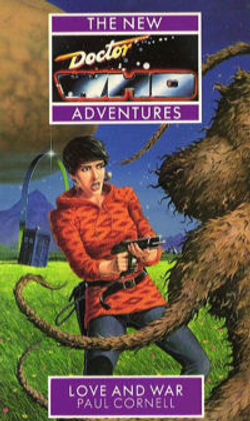The NTS Interview - Paul Cornell
There are precious few writers out there whose name on a project is an almost cast-iron guarantee of quality. When it comes to Doctor Who, there’s perhaps only one other name aside from Steven Moffat whose scripts are sureto be among the best the show has produced – the writer of series one’s “Father’s Day” and the stunning series three two-parter “Human Nature”/”The Family of Blood”, Paul Cornell. This near-flawless success rate has also begun to translate to the comics field, with the launch of Paul and artist Leonard Kirk’s new series Captain Britain and MI:13. A direct continuation of his critically-acclaimed miniseries Wisdom, Captain Britain seeks to re-establish the idea of true British superheroism and place its characters back at the forefront of the genre – and with its first three issues already sell-outs, it’s one of Marvel’s biggest new hits.
 |
Shortly prior to the release of Cap issue #1, Noise to Signal’s Seb Patrick, James Hunt and Julian Hazeldine caught up with Paul at the Bristol Comics Expo, where he was happy to spend half an hour chatting about Who, comics, future telly plans and more in his customarily talkative, enthusiastic and engaging fashion…
When your series was originally announced, it was going to be a continuation of Excalibur. That’s changed, obviously, and I just wondered is this purely a title change, or is it reflective of the way the book has changed?
It’s a little bit of both, in that Marvel had relaunched Excalibur several times, and I think it’s nice that we’re obviously a new book, because there’s a little bit of an issue in terms of using the same title over and over. And I think – and this is something that will become much more clear around issue four or five – we do actually stand for something, as a book, we’re not just “that British book”, we’re doing something specific. And Excalibur wouldn’t have covered that, whereas MI:13 says there’s going to be an intelligence element to this book. And I just think it says that it’s different, and I’m very pleased with that. And also, as becomes clear from the cover of issue #2, the sword Excalibur is in this book. So, we incorporate Excalibur, let us say.
So in taking on Captain Britain, you’ve obviously got some fairly big shoes to fill, in the shape of Alan Moore… how do you feel about that?
Well, I wasn’t really worried about it, but now you’ve underlined that… well, goodness, Jamie Delano and Alan Davis as well, so no pressure!
Were you a fan of that run?
Oh yeah, hugely, I mean, who wouldn’t be? It’s terrific, very swift comics – I love how he uses the shortness of the original stories in the weekly format as a strength. And you’ve got Chris Claremont, of course – Chris’ original run is something that’s very much a touchstone for me on this, because I was very impressed by those as a kid, and I also think it’s Herb Trimpe’s best work. So you do feel that you’re carrying on a great tradition, established by some fine writers, and it’s nice to have something to live up to. I always say that I’m writing this like it’s the most important book in the Marvel universe, because what would be the point of getting a comics job and writing it as if it wasn’t the most important? Because then you just shuffle on, be apologetic and shuffle swiftly off again, and that’s not what this is about. You’ve got to do your best.
Is it purely coincidence that a British writer such as yourself is taking on the return of an identifiably British character, or is there a bit more to it than that?
I think they wanted to choose a British writer – but there are an awful lot of British writers in comics! It was an idea of [editor] Nick Lowe’s, who’s been wanting to do an MI:13 comic for a long time – Wisdom’s title was initially MI:13 – so this is basically us doing Wisdom by other means. The influence of Nick Lowe on this book can’t be overestimated – we’re really a partnership. I like to think it’s me, Nick and Leonard Kirk, and we are a little unit – so much so that I invited Nick into the original interviews, but then I realised that there were going to be over two dozen interviews, and he had better uses of his time – while it was part of my job to go out there and talk about rubbish!
As far as I’m aware, MI:13 hadn’t appeared pre-Wisdom. Was that Nick’s idea?
Entirely. I got into this business thanks to Mark Millar emailing me after my Doctor Who episode, saying “Do you want to write for Marvel comics?” – which was one of the better e-mails I’ve got in my life! – so he paired me up with Marvel’s talent guy, and Marvel’s talent guy found Nick Lowe, and we clicked in a wonderful way, I think. He’s about 12, he’s like Scooter from The Muppet Show, he’s full of passionate enthusiasm, and he really knows comics. So it’s really nice – what I tend to do is do a first draft that’s a bit wild, and a bit out there, and tries all sorts of new things, and he’ll say “Well, that doesn’t work, you can do that this way, put that panel there and it’ll read fine”, and so on. He’s really encouraging, and it gives me something to push against.
You had written comics before, but did you ever aspire to write for Marvel?
Oh, yeah, I’ve been aspiring to write for Marvel my whole career, really! I had a couple of little goes in the past, I had some nice correspondence with Bob Shreck when he was doing Batman at DC, but I wasn’t ready, and Bob really kindly pointed out what was wrong with my scripts in a positive way. And I had some correspondence with Dan Didio a couple of years ago. But Marvel really got behind me and took me in, so I’m very pleased about that.
I have to say, as an aspiring writer, to hear that someone at your level wasn’t really ready to write comics then is hardly encouraging!
 |
Well, it’s about learning new forms. One of the things that I didn’t really grasp early on was just how much emotional content you have to put into a comics script, in that I’d been raised on reading example scripts by the likes of John Wagner on Judge Dredd. Now John’s known his artists so long, and their work so well, that he could write a script that would literally go, “DREDD STANDS WITH BIKE. DREDD POINTS”. Whereas to give an artist a feeling of something to work with, what you need is a script that’s much more “It’s raining. Rain like you’ve never seen. Rain like rain will never end…” And initially I did that, and I did at the start with Leonard, but now I can see how Leonard will draw something – and I’m always amazed by it – so now I’m at “WISDOM POINTS. WISDOM WITH BIKE”! In fact, we had a wonderful experience with issue one of Cap, of discovering that we didn’t need a lettering draft, because every expression suited what the characters were already saying perfectly. And that’s a first for me – I’ve never met an artist where I didn’t want to go back and do a little tweak and change something the characters were saying. It’s a really nice team effort, and one of those things where something becomes bigger than the sum of its parts, because everybody’s pushing each other. And Leonard is such a lovely man – he’s a Canadian guy, deeply bearded, very shy. I went up to him at NYCC, having found him, shook his hand and said “Let’s go out for a pint, because I just want to spend an evening telling you how wonderful you are”, and he visibly shrank and went “Oh dear, oh no”. He’s very humble. And I really think this is his best work yet – there’s something about the energy of it. And we’ve got Bryan Hitch! He was only supposed to be with us for the first four covers, I believe, but now he’s with us for the duration.
And finally on the comics front, you’ve got this Fantastic Four story coming out… how did that come about?
Ah, yes, “Reader, I clobbered him”! Well, I was asked if I wanted to do a Fantastic Four miniseries, and because they’re explorers, I wanted to find them something new to explore. So fiction just came to mind as an interesting place for them to go – and a place they hadn’t been before. And I actually get to play with a big Marvel villain in this one that has been around since the start of the Marvel universe, but that the Fantastic Four have – fantastically – never met! So that’s really nice to actually do a meeting between two big Marvel characters that have somehow avoided each other. I sat down with Stuart Vandal – the guy from the Handbook of the Marvel Universe – last night, because he’s been responsible for helping with a lot of stuff. Because I love continuity, I think it gives you something to work with, it gives you a point to start stories. Basically, if you never use it as a weight, or something you have to deal with, but use it as something you want to deal with, and a place for you to start from, then that’s really valuable. And his ability to always be able to say “I can find that out for you” has been really helpful. We’re trying to establish that all of Marvel UK is still there. As has already been revealed [in Captain Britain #1], all British superheroes are now de facto members of MI13 under the emergency government powers, so we’ll be visiting loads of it, at least briefly.
This is something I wanted to bring up, actually, because Marvel – certainly moreso than DC or anybody else – has always had various British characters running around. It’s a well that’s not really been tapped very often, but do you feel it’s important that these characters should be out there at the forefront of the Marvel universe?
Oh yeah, absolutely – I think that’s my biggest aim, really! I want to make Captain Britain a proper, representative hero. Because he’s been, on occasion… it’s not so much a case of Americans not understanding him, as this weird British cultural thing where we write our hero as a bit useless! And I’ve seen people on comics forums popping up and saying “We demand for him to be useless!” No! No no no! You can have other flawed heroes! He of course has his flaws, but he is our Captain America, and he’s going to be written as such.
So moving on to your television work, what have you got in the pipeline on that front? Obviously I know you can’t talk about specific Doctor Who plans, even if there are any, but I presume that’s something you’re always interested in coming back to?
Well, I’m always available for selection for Doctor Who. But I’ve got two shows of my own on the go at the moment – one with ITV and one at the BBC. The BBC one has been around in different incarnations, recommissioned three times, for three years – and finally looks now like it’s going ahead. It’s called Super, and it’s about four girl superheroes sharing a flat. It’s kind of a Buffy-esque superhero show, quite different to Heroes. I thought Heroes would be the end for this pitch, but actually, it’s really encouraged the BBC to go for it. We’re into the capes, glasses, masks – the superhero archetypes. We do all the things that Heroes doesn’t do. It’s meant to be a Saturday night 7 o’clock show – or it might end up being a BBC Three thing, in a similar vein to those pilots they’ve been doing [Kung Phoo Action, Being Human]. But we’ll find that out shortly, when my forces within the BBC convene! Something that people tend to forget about the BBC is that it’s not a monolith, it’s lots and lots of gangs, and to find one’s own gang in the Beeb is a tremendous experience.
Did you start on this before Doctor Who came back, then?
It must have been about the same time, actually. So it’s been a long time!
You’ve been involved with Who for years, with tie-in novels and things like Scream of the Shalka, but how did your writing for the new series come about?
Well I’ve known Russell for a long time. We originally met when I was working on an idea for Steven Moffat’s dad – there was a Channel 4 production call for a new teenage show, and we pitched for it. And I wrote three of the scripts, and Russell wrote one, and he was brought in to plot the whole arc of the show, really. And we really got on – he was obviously going places – and we kept in touch after that. And we came second to Hollyoaks! So I always had the thought in my head, when he brought back New Who, that I might be on it – and he called me really early on in the whole process to say that there was really bad news: that we weren’t going to be doing any more of Shalka and Richard E. Grant’s Doctor. And, you know, I was delighted that he was bringing it back. But at the end of the phone call he said “And, you know – if you’re not careful…!” So for six months I’m on tenterhooks!
Was “Father’s Day” an idea you’d had before the show was brought back, or something you came up with during the process, or what?
No, that was an idea of Russell’s, which read “This is the low-special-effects Play for Today episode. Rose sees her dad die over and over while the Doctor finds out what a good man Pete Tyler was. And there are no monsters.” So originally it was written without monsters – I think “no monsters” is going to be the shaggy dog story of my time on Doctor Who. And at one point Chris [Eccleston] had an emergency of some kind, and there was the possibility of a draft without the Doctor in. And that would have been just terrible!
 |
There’s been a lot of discussion online in the wake of James Moran’s episode (The Fires of Pompeii) based around the idea of changing the past having dire consequences. People seem to be taking Fathers Day as having established some pretty firm rules about that kind of thing – was that anything like your intention?
The way I view it is that the Reapers came about as a result of some extraordinary circumstances – the Doctor and Rose not only changing time, but changing time while two of them were there at the same moment. They really pushed the fabric of space time! I certainly didn’t want to leave it with the impression that every time someone made a minor change to history the Reapers would pop up – if that was the case, you’d have a very dull show!
What do you think is – or what would you like to be – your legacy to the series?
I like the idea that I came along and… something I’ve always tried to do with Doctor Who, for some reason, is emotional storytelling, about relationships. That’s something that ever since my fan fiction, I’ve tried to do. And Doctor Who, back in the day, wasn’t like that. So my fan fiction wasn’t really in tune with old Doctor Who – it’s really in tune with the programme now, but not as it was then. But I’d like to be more than ooh, that guy who did the one with…
You mentioned Shalka before – did you have much planned for stories to follow up after that?
Oh, yeah, we certainly did. I had a document somewhere about what the big deal was, why Gallifrey was dead, and so on…
That’s quite a common plot thread, really…!
Yeah, we had the mobile phone, we had a dead Gallifrey… all these things that the new show did!
Actually, I remember watching the end of “Last of the Time Lords”, and when the Doctor started talking of keeping the Master prisoner in the TARDIS, I thought “Hang on, that’s Shalka!”
Yeah… I wrote to Russell at the time and said “I thought of Shalka at that point”, and he said “So did I…!”
Another part of your Who legacy, of course, is the creation of Bernice Summerfield. She’s a popular enough character that people have talked about wanting to see her show up in the series – depending on rights issues and so on, could you see that ever happening?
Well, she could appear, because the only person they’d have to ask is me, and I’d say yes. But on the other hand, as to whether she should… there’s a question of what would be the point, really? It’s a big mainstream show which has to appeal to as many people as possible all the time. You might as well create a new character that we meet with the audience, who has the same sort of function.
 |
Would you say a similar sort of thing about someone like Ace – a character you’ve also had strong attachment to – whose story was never really brought to its proper conclusion onscreen?
No, I wouldn’t say that about Ace – there would be lots of people out there who knew Ace, and not a lot of people that knew Bernice.
In a way, it almost seems in hindsight that the Who revival was always going to succeed – unlike various other sci-fi shows that could be brought back, it’s something that was always in the national consciousness, even if it was seen as a joke by some people. Did it feel like that at the time?
Well, the night before “Rose” was broadcast, you could still get odds on Ant and Dec winning that timeslot – they were the narrow favourites. But ten million… Russell was expecting six, and that would have been a massive success. Ten changed the BBC forever. I remember, in those fifteen years between the series, having meetings with people at the BBC where they’d actually hide their Buffy toys in the desk drawer, and bring them out once they’d asked you some careful questions to work out whether you were a geek! It was the love that dared not speak its name! And unlike with Julie Gardner at LWT on the other side of the river, who organised meetings with me so that we could spend the first fifteen minutes talking about last night’s Buffy, there was a real feeling in the BBC that fantasy was dead, that science fiction was something you didn’t talk about. Look at the half-hearted way they got into and promoted Invasion: Earth – they didn’t know how to sell it, the Radio Times were even suggesting it was a parody! Not only that, but there were not families watching telly any more – there was no such thing as family viewing. But ten million sort of said to them that family viewing was back, and that they’d been wrong. I mean, you could say that on at least two occasions – Queer as Folk being the other – that Russell has changed the shape of British public life, and that’s an extraordinary thing for a writer to do.
The first three issues of the ongoing Captain Britain and MI:13 series are out now (although you might have to wait for the second printings to show up), and a trade paperback will probably show up when the first arc has finished. You can check out James and Seb's reviews of all three over on Comics Daily here, here and here. The sort-of-prequel miniseries Wisdom is also out in trade form and should be obtainable by all good book and comic shops. We highly recommend you get one to obtain it for you.
About this entry
- By Team NTS
- Posted on Thursday, July 24 2008 @ 4:00 pm
- Categorised in Comics, TV, Interview
- Tagged with doctor who, paul cornell, captain britain and mi13, wisdom
- 6 comments

“It’s called Super, and it’s about four girl superheroes sharing a flat.”
Powerpuff Girls? ;)
Good interview (I think), although I skipped a lot for fear of spoilers.
By Marleen
July 24, 2008 @ 9:00 pm
reply / #
> And at one point Chris [Eccleston] had an emergency of some kind, and there was the possibility of a draft without the Doctor in.
Well you can tell he’s somewhat ill during much of the episode, most notably the church scenes. And yeah it would have been crap without him in it. That’s the good thing about Who, you get great stories (sometimes…), characters and then you get the bonus of the Doctor being in it too, which immediately turns the show into something else, something better. Eccleston is so good in this as well, regardless of his shorter screentime (it would be interesting to know whether him being ‘killed’ by the Reaper was written in due to Chris’s illness). His and Billie’s pairing is 100% pure gold here. Especially at the beginning when they’re watching Pete getting mowed down.
> “Father’s Day” gave us, among other things, one of New Who’s earliest “classic” moments
Definitely! Though I always think he should turn around and shout ‘guys, someone forgot the fucking greenscreen again!’ Seriously, as individual one-off episodes go, Father’s Day ranks among the very best. Only Moffat’s Blink and The Girl In The Fireplace sit alongside it.
> Kung Phoo Action
Stop getting the name of the greatest television programme ever made wrong!!
By wankmeofflikear...
July 25, 2008 @ 2:04 am
reply / #
> Eccleston is so good in this as well, regardless of his shorter screentime (it would be interesting to know whether him being ‘killed’ by the Reaper was written in due to Chris’s illness).
I’m ignorant, I never noticed this. :(
By Marleen
July 25, 2008 @ 8:04 am
reply / #
I never noticed anything either, to be honest…
By John Hoare
July 25, 2008 @ 12:59 pm
reply / #
I really like the way that The Doctor sort of gave hints but couldn’t bring himself to just say to Pete ‘look, you’re gonna have to throw yourself under that car to end all this’
By wankmeofflikear...
July 26, 2008 @ 1:03 am
reply / #
I watched Father’s Day the other day on UK Gold. I’ve seen it a couple of times before, and still think it’s one of the best episodes…but it makes no sense whatsoever.
By Pete
July 27, 2008 @ 12:24 pm
reply / #